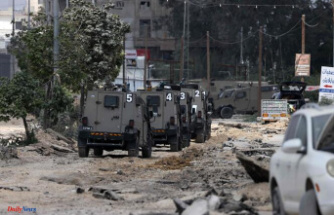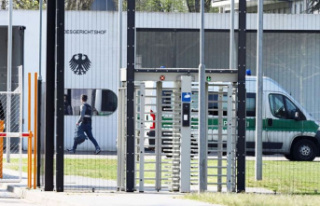The site of the former Berlin-Tegel Airport is back to normal activity - albeit differently than the administration and citizens had imagined. A tent city has sprung up on the former runway, and up to 900 refugees can now be accommodated there.
Berlin's Social Senator Katja Kipping (left) had previously declared a state of emergency - because the accommodation for asylum seekers in the capital is full. A new task force has been scouring the federal capital since this week for housing for migrants, for every free square meter.
In other regions of the country, no emergency plans are in place, but the situation there is tense in many places. It is true that fewer war refugees from Ukraine come to Germany. “But people are less willing to take in Ukrainians privately. It makes a difference whether you take someone into your guest room for a few days or weeks or for months," says the district administrator of the Rhineland-Palatinate district of Bad Kreuznach, Bettina Dickes (CDU). "As a result, we are now building a container village for up to 200 people to accommodate everyone."
The picture is similar in other regions: "Since Frankfurt is the main port of call for Ukrainians in Hesse, the city's reception capacities are almost full," says a spokesman for the city. In Weimar, the admission of new war refugees is being postponed for the time being because all accommodation is occupied - and these are just two examples of many.
The acute challenge faced by many municipalities is that they have to accommodate war refugees and a growing number of asylum seekers at the same time. Last summer, there were an average of 8,000 asylum seekers per month who had to be cared for, and around 13,000 are currently being added every month. And even if the influx from the Ukraine decreases, the cities and communities that the Ukrainians often head for will be overwhelmed.
“The problem is that the large number of Ukrainian refugees is concentrated in a few cities like Berlin, Hanover or Dortmund. These are hubs, many have arrived there and from there, they hope, they can quickly get to the Ukraine,” says Gerd Landsberg, General Manager of the German Association of Towns and Municipalities.
The example of the Bad Kreuznach district or the Ilm district in Thuringia shows that the situation in the countryside is often no more relaxed: "We won't be able to anymore soon - cities and districts are on the verge of collapse," says the local district administrator Petra Enders (independent ) the location. Because unlike with asylum seekers, the authorities cannot control the influx of Ukrainian war refugees - because these people are free to choose their place of residence.
Helmut Dedy, General Manager of the German Association of Cities, describes the result as follows: “So far, the refugees have not been evenly distributed across all cities and communities. As a result, Ukrainian refugees are coming to cities that are already stretched to the limit in terms of accommodation and care, while there is still untapped capacity elsewhere.”
The result is that some countries are no longer accepting asylum seekers because the quota has long been fulfilled, while others are no longer accepting war refugees from Ukraine. And that is causing resentment between the federal states.
Berlin's Senator for Social Affairs, Kipping, had really fueled the dispute over the distribution last week. She justified the state of emergency by saying that the capital is currently having to take in a disproportionately large number of asylum seekers because “almost all other federal states” have left the nationwide distribution system called EASY. In addition, it is the number one destination for war refugees from Ukraine. “Berlin has to cushion that now,” complained Kipping.
According to the information from Berlin, twelve federal states have currently opted out of the admission procedure for asylum seekers. Reason: There are no more accommodation options.
At the same time, more and more districts, municipalities and federal states are no longer accepting refugees from Ukraine. Justification here too: no accommodation options. In Lower Saxony alone there are currently 17 cities and districts, including Hanover, Oldenburg and Göttingen.
Saxony announced on Tuesday that the entire Free State would not take in any more war refugees for the time being. The Federal Office for Migration and Refugees explains that the nationwide distribution of asylum seekers and war refugees is not suspended, but "cross-state distribution in some federal states is limited due to special situations ... with temporary closures".
It is unlikely that the criticism from Berlin will increase the willingness to accept in the other federal states - on the contrary. Without a doubt, the capital is the number one destination for Ukrainians.
However, a survey by the Federal Ministry of the Interior also revealed that around two-thirds of war refugees are staying with friends, family or in other private homes, i.e. they do not have to be accommodated by the state. An evaluation of the EASY statistics then shows that Berlin takes in exactly as many asylum seekers as it has to as a state, so there is no overload.
And then the representatives of the other federal states regularly experience that Berlin is vehemently committed to a “right to stay for everyone” and against deportations. Around 18,000 people who are obliged to leave the country are currently living in Berlin, but they usually quickly receive toleration and a few years later residence permits.
Apart from that, Reinhard Sager (CDU), President of the German District Association, does not believe in offsetting refugee groups against each other: “If some federal states now either do not accept any Ukrainian refugees at all or no longer accept asylum seekers because they have allegedly exceeded the number of admissions for one of these groups of people, then we quickly get into trouble,” he warns. "We are not solving the reception and accommodation problem by the countries offsetting one group of people seeking protection against the other."
"Kick-off Politics" is WELT's daily news podcast. The most important topic analyzed by WELT editors and the dates of the day. Subscribe to the podcast on Spotify, Apple Podcasts, Amazon Music or directly via RSS feed.












